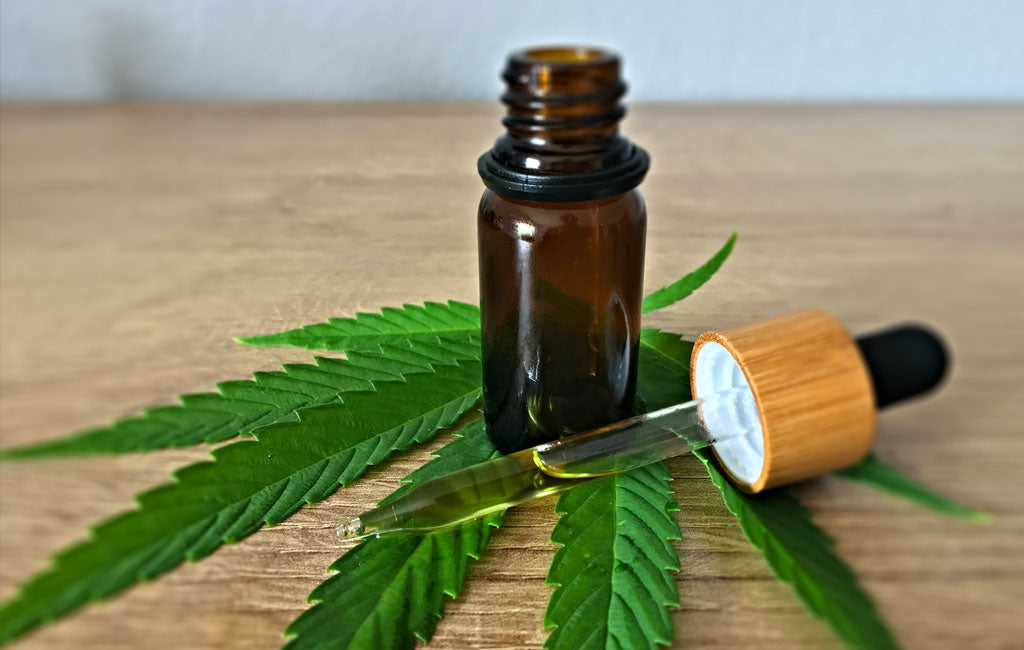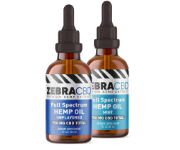
Although it was once on the United State government’s list of federally recognized controlled substances, legislation over the past decade that liberated hemp from that designation has made it possible for companies to develop, manufacture and market wellness supplements containing certain hemp-derived ingredients.
Now, products that use the chemical compound CBD are steadily growing in popularity, with sales in that industry expected to reach $11 billion by 2027.
The federal legalization of hemp coupled with the success of CBD products has encouraged manufacturers to look more closely at other hemp compounds in addition to CBD, such as cannabichromene or CBC. But when it comes to CBC vs CBD, what are the differences?
It’s believed that CBC interacts with cannabinoid receptors in the brain in ways that are similar to other hemp compounds, like CBD.
Let’s take a closer look.
What Is CBD?
Cannabidiol, or CBD, is one of more than 100 chemicals that are found in marijuana or cannabis sativa plants. Because it doesn't contain tetrahydrocannabinol (THC), it doesn't produce the intoxicating effects associated with marijuana. However, it is important to remember that CBN vs CBD are different and have their own therapeutic effects.
In 2018, Congress passed the Agriculture Improve Act in 2018, which legalized the cultivation of hemp plants on a federal level and, by extension, gave the green light to the production and sale of products containing CBD. Now, there are many products available that contain CBD, including:
- Oils
- Capsules
- Foods like CBD gummies
- Cosmetics
- Lotions
That being said, it’s important to keep in mind that although the federal government has officially removed hemp-derived CBD products from its list of controlled substances, many states have not. As such, the legality of CBD and products that contain it can differ depending on where you live.
What Are The Potential Benefits of CBD?
Because using any CBD product was considered an illegal substance until very recently, the potential therapeutic benefits of CBD oil are a subject that’s still being studied by scientists. And though much of the research has been conducted on animal subjects, there is plenty of optimism — and even more curiosity — surrounding the topic of how CBD may be able to help people in their daily lives.
Science is a little bit more clear on how the CBD isolate interacts with the cannabinoid receptor in the human brain. Specifically, the part of the brain called the endocannabinoid system, or the ECS. This system sends messages from the brain to the body, and vice versa, impacting many functions of the body — from sleep to immune response.
Within this interaction, some studies have found potential benefits of CBD isolate, including:
- It may ease nervousness – CBD is believed to have a calming effect on the human brain, suggesting that it may be useful for helping manage a range of uncomfortable feelings such as apprehension, restlessness and uncertainty, among others.
- It may ease sleeplessness – According to some reports, there’s a possibility that CBD may help promote restful sleep, which may make it easier for you to fall asleep and support better overall sleep hygiene.
- It may ease joint stiffness – Because some studies suggest that CBD could help curtail inflammatory responses in the body, the compound could help support healthy joints.
- It may reduce facial blemishes – Other studies have drawn a correlation between CBD use and a reduction of facial blemishes. If skin concerns are your main focus, find more information on CBD skincare.
What Is CBC?
Like CBD, the chemical compound CBC, or cannabichromene, is sourced from hemp. So what is the difference between CBD and CBC?
A crucial difference between CBD and CBC oil is that the latter isn’t sourced from hemp flower but rather from the plant’s CBGa stem cell.
Although scientific research into CBC extract and how it may or may not affect the human body dates back to 2006, exhaustive research into the chemical compound has been slow to develop.
That said, the research that is available sheds a bit of light on the interesting relationship between CBC extract and the human brain. It’s believed that CBC works with cannabinoid receptors in the brain in ways that are similar to other hemp compounds, like CBD.
For example, there is research that indicates that CBC has a difficult time attaching to the brain’s CB1 cannabinoid receptors — the same receptors that THC molecules attach to. The inability of CBC molecules to do the same explains why the compound isn’t capable of inducing the same “high” you experience when the interaction of THC with CB1 receptors floods your system with the euphoria-inducing hormone known as dopamine.
Instead, CBC molecules seem to have an easier time latching onto two other cannabinoid receptors. They are:
- Vanilloid receptor (TRPV1) – The vanilloid receptor is connected to sensory nerve fibers throughout the body, as well as certain cells in the heart and muscles. Among its many tasks is to send messages to the central nervous system that eventually result in the expression of discomfort.
- Transient receptor potential ankyrin 1 (TRPA1) – This receptor is associated with several of the human body’s physiological processes. The list of these processes includes but is not limited to swallowing, gut motility and discomfort.
What Are the Potential Benefits of CBC?
Similar to CBD, scientific research is still underway to develop more findings on the concrete therapeutic effects of CBC. However, recent studies examining how CBC connects to receptors mentioned above support the promise this connection holds for providing relief and support in the human body.
Indeed, CBC attaches to the TRPV1 and TRPA1 receptors, both of which have connections to the nervous system and, by extension, connect to how our bodies register, process and experience discomfort. Most recent findings support a link between CBC and a range of neurological functions as a result of this connection, and show CBC's potential to yield a number of the following benefits:
- Anti-inflammatory properties – CBC has demonstrated the ability to reduce inflammation in both cell and animal models, making it a potential option for managing conditions like arthritis or inflammatory bowel disease.
- Antimicrobial effects – Studies indicate that CBC products are effective against certain bacteria, including antibiotic-resistant strains like MRSA, and may help combat fungal infections.
- Pain management – CBC has shown antinociceptive properties, meaning it may help alleviate pain, particularly in inflammatory conditions or nerve-related discomfort.
- Anticonvulsant potential – Emerging research suggests that CBC may have anti-seizure benefits similar to CBD, particularly for conditions like epilepsy.
These findings underline the therapeutic promise of CBC products, though more research is needed to fully understand its potential benefit and applications.
Can You Take CBD and CBC Together?
Additionally, researchers are curious to know whether CBC follows the lead of its cousin compounds, like THC and CBD, and takes part in a phenomenon called “The Entourage Effect.” This refers to the way that, when taken together, THC and CBD work in concert and enhance each other’s therapeutic effects.
Although research on CBD and CBC as a combination is still new, anecdotal evidence suggests that combining them could provide a broader range of potential therapeutic benefits, such as enhanced anti-inflammatory or pain-relieving effects. If you're considering using these cannabinoids together, starting with small doses and consulting a healthcare provider may help you determine the right balance for your wellness goals.
When to Take CBD and CBC
As stated, the research on CBD and CBC is still ongoing, and the benefits and best uses for CBC are even more undefined than those of CBD. Understanding these nuances can help you make informed choices about incorporating them into your routine.
When to Use CBDResearch into CBD, though still in its infancy, is more available. Based on its interaction with cannabinoid receptors, we’re able to glean a little insight into when you should use CBD.
Because the potential therapeutic effects of CBD are so wide-ranging, there may not be any hard-and-fast rules regarding the best time of day or night to use it. Instead, it’s recommended that dosing should occur at a time when it will best serve your desired purpose and potentially yield the results you want.
To that end, here’s when you can use CBD depending on your reasons for taking the supplement:
- For sleep – There’s evidence that suggests that CBD may have the ability to promote restful sleep, which could make it useful for inducing feelings of tiredness and improving your sleep. If you’re considering using CBD to combat restlessness, consider using CBD supplements shortly before bedtime.
- For energy – On the other hand, some people take CBD supplements in order to boost their energy levels and alertness. Using CBD in the morning may help you get started on your day, while supplementing after lunchtime could help prevent after-lunch lag.
- For nervousness – First thing in the morning may also be the best time to use CBD if you’re hoping to ease generalized nervousness, apprehension or unease. If you’re experienced in using CBD, you may choose to use it during the day to achieve similar results.
- For your mood – CBD shows some potential as a mood enhancer. Taking it in the morning could possibly help you maintain a sunny disposition all day long. Again, experienced users who know what to expect may take it anytime their mood takes a dip or they’re feeling like they could use some mood support.
Finally, it’s important to keep in mind that medical professionals recommend that people who are new to CBD products refrain from taking them at any time except before bed. They also recommend beginning with small doses and slowly working your way up until you are able to gauge the effect that CBD has on your unique body.
When to Use CBCAlthough less extensive than CBD, research on CBC is even more limited than CBD, but early research on CBC and its wellness benefits suggest potential use cases from skin care to pain relief:
- For pain – CBC shows promise in reducing discomfort, particularly inflammatory and nerve-related pain. Taking CBC when pain flares up, such as post-workout or after a long day, could help ease discomfort and promote relaxation.
- For skin health – CBC’s antibacterial and anti-inflammatory effects may support skin health, potentially aiding in the treatment of blemishes or minor wounds. Applying CBC-infused topicals directly to affected areas can help soothe irritation and promote recovery.
- For mood support – Some studies indicate CBC may help with depression-like symptoms. If you’re exploring its use for mood regulation, trying it in the morning may help set a positive tone for your day.
For CBD Simplified, Choose Zebra CBD
With so much research still to be done before we can understand the full extent of the body’s relationship with CBD, CBC and other hemp-derived chemical compounds, it’s natural to have confusion about when to take, how to take it and what to take it for. If you’re considering trying CBD supplements, you’ll want to be sure you try the purest version without additives or pesticides.
At Zebra CBD, we believe in the power of CBD to promote your general wellness and vitality and help you manage whatever life throws your way. And we know that the first step is finding a manufacturer that works with you to take the worry about taking CBD supplements.
We’re simplifying CBD products by making them easy to use with condition-specific formulas, clear dosing instructions and a Label Accuracy Guarantee™. When 70% of CBD products don’t meet label claims, you can count on ours as your trusted source, made locally in the USA. Find CBD topicals, CBD hemp oil for sale, CBD gummies for sale and beyond.
Shop our pure CBD and CBC supplements to get started today.
Sources:
- Healthline. CBD Sales Projected to Hit $11 Billion by 2027: Is It Safe, Effective? https://www.healthline.com/health-news/cbd-sales-projected-to-hit-11-billion-by-2027-is-it-safe-effective
- Centers for Disease Control. CBD: What You Need to Know. https://www.cdc.gov/marijuana/featured-topics/CBD.html
- WebMD. How Pot Affects Your Mind and Body. https://www.webmd.com/mental-health/addiction/marijuana-use-and-its-effects#1
- Annual Reviews. The Vanilloid Receptor: A Molecular Gateway to the Pain Pathway. https://www.annualreviews.org/doi/abs/10.1146/annurev.neuro.24.1.487
- Scientific Reports. New natural agonists of the transient receptor potential Ankyrin 1 (TRPA1) channel. https://www.nature.com/articles/s41598-020-68013-2
- Healthline. The Entourage Effect: How CBD and THC Work Together. https://www.healthline.com/health/the-entourage-effect
- Medical News Today. When are the best times to take CBD? https://www.medicalnewstoday.com/articles/when-should-you-take-cbd-oil
- Maddyness. How CBD impacts the brain. https://www.maddyness.com/uk/2022/01/26/how-cbd-impacts-the-brain/
- ASPET. The Potential of Cannabichromene (CBC) as a Therapeutic Agent. https://jpet.aspetjournals.org/content/early/2024/05/22/jpet.124.002166










